
Summarize Content With:
Quick Summary
There might have been times when you faced difficulties while working on a specific task, and felt overwhelmed by the time and effort it takes? You can always opt for using AI in your work to make it better and sound. In this blog, we will know how we can grow potentially by using AI for operational efficiency to manage tasks.
Introduction:
Operation management is always about how a task is done more efficiently in a time saving way and making the process as smooth as possible. It includes tasks such as creating a plan, organizing and maintaining proper supply chain of work, it’s not just about scheduling and follow ups but quality controls, logistics and effective running or processes.
AI is not just about computers and research these days, but an assistant that enables efficient work completion while stimulating human intelligence and similar capabilities. Incorporating AI call assistants along with relevant tools aligning with your needs can help you grow fundamentally.
Six Key Challenges Faced by Organizations:
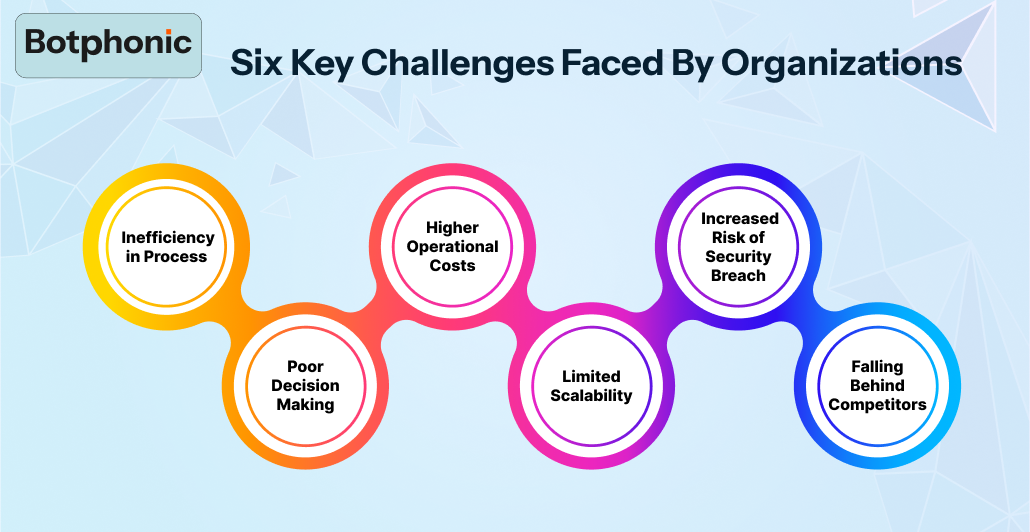
1. Inefficiency in Process:
There are organizations that still rely heavily on manual paperworks, which are rather time-consuming and repetitive and also makes the process slower and prone to human error.
2. Poor Decision Making
A decision regarding the business is a powerful step, that too if taken without proper analytics and insights can lead to a mishap never expected. It limits the ability to predict trends and risk that might arise in the industry.
3. Higher Operational Costs:
With manual labour and outdated resources, the process requires more than what it needs. It increases the chances of error rates, which indirectly leads to costly rework and waste of used resources.
4. Limited Scalability:
Traditional systems and methods are not meant to handle the complexity and volume of multiple tasks efficiently. Scaling operations without proper automation can indirectly lead to increasing cost growth.
5. Increased Risk of Security Breach:
There are times when manual monitoring is less effective in identifying threats and bugs. It creates difficulty in maintaining compliance even in real time with the evolving regulations. It might lead to data breaches and if not checked even audit failures.
6. Falling Behind Competitors:
If compared with the businesses that are using AI for their operational efficiency, you might fall behind in following trends and keeping pace with the new generation. Organizations using AI can operate faster, cheaper, and even smartly than manual responses.
Key Benefits:
AI has become not just a tool but a necessity to make your business grow exponentially with smartness and precision. It helps businesses to overcome challenges that even they didn’t know. From automating tasks to improving customer satisfaction, AI has got it all.
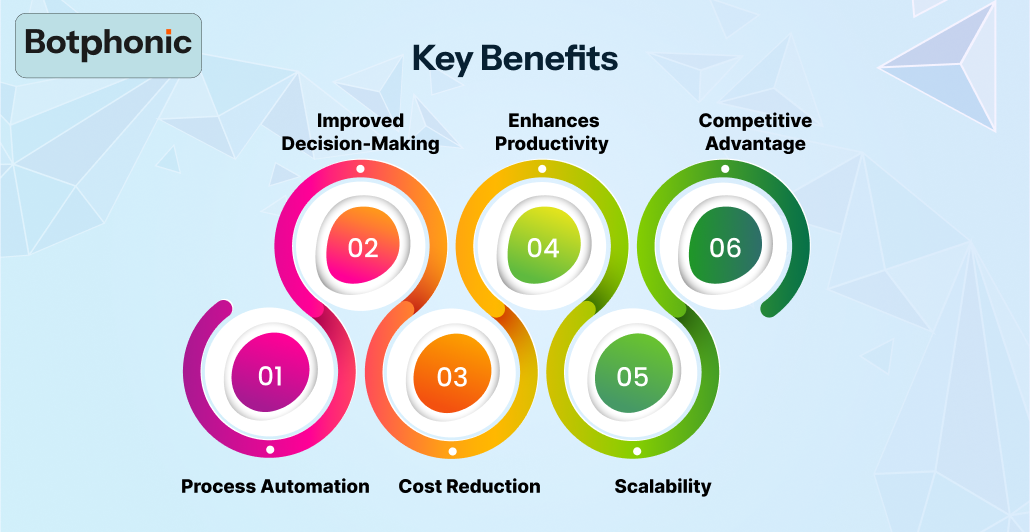
1. Process Automation
By adding artificial intelligence, it helps reduce the workload by managing tasks which are time consuming and repetitive. It can help with hassle tasks such as data entries and customer inquiries too.
2. Improved Decision-Making
With the help of predictive analysis, involving machine learning, analyzing previous data, it helps organizations to make some informed decisions and improve their strategic planning. By using tools effectively you can enhance risk assessment.
3. Cost Reduction
By using AI tools the operational costs minimizes while reducing the inefficiencies and avoiding errors, it helps optimize resources and lowers downtime in equipment.
4. Enhances Productivity
Unlike human beings, AI can perform tasks without feeling fatigue and stress. It can help you save time while your potential employee can focus on tasks which are of higher priority. It helps multitasking on various projects at once and helps faster turnaround times.
5. Scalability
AI solutions help grow business needs as the data and operational tasks increase so the complexity, but it can adapt and handle the tasks that can overwhelm the human teams. It helps minimize the stress over manual overhead and creates seamless scaling of processes.
6. Competitive Advantage
Businesses which are open to the idea of using AI in their team have grown without any doubt, such as it gives them a point of strategic edge, which helps innovate faster than their competitors and deliver better customer experiences.
Harnessing AI Efficiency in Various Fields
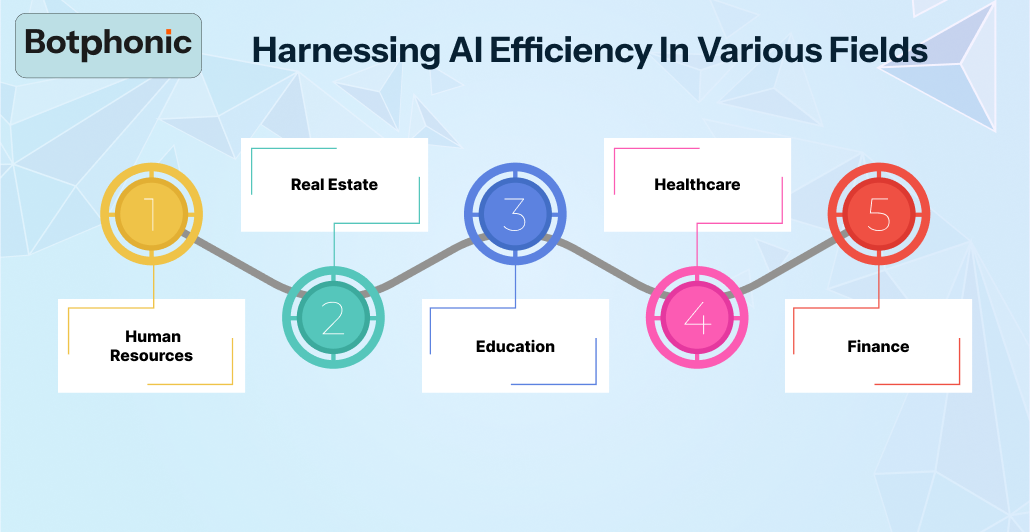
AI has not just been a trend but become a transformational tool, which increases the operational efficiency across diverse industries without getting overwhelmed.
1. Human Resources
AI is helping revolutionize the HR departments by streamlining recruitment, employee management and with strategic workforce planning.
How does AI impact efficiency?
- Candidate Screening: It helps automate candidate screening, by scanning resumes and raking them based on role fit.
- Chatbots: With the help of bots HR staff can fully focus on complex tasks by leaving common FAQs for conversational bots.
- Onboarding Tools: With the help of personalized training and onboarding, it helps deliver content based on the joinee’s role and skills.
2. Real Estate
AI helps bring automation and intelligence to property management by investment analysis and customer experience.
How does AI impact efficiency?
- Property Value Estimation: AI models help analyze the market trends and property features which lets them estimate the future values precisely.
- Virtual Assistants: With the help of AI assistants such as chat bots or calling assistants, you can handle property inquiries and schedule viewings accordingly.
- Document Automation: Various documents such as lease agreements, legal documents, and even transaction details can be auto generated and reviewed by AI.
3. Education:
AI is helping reshape the learning experience, through providing personalized and data-driven performance monitoring.
How does AI impact efficiency?
- Adaptive Learning Platforms: Ensuring to create a curriculum based on pupil’s strength and weakness.
- Automated Grading: With AI tools marking tests, quizzes and even short answers, it saves educators times leaving them to focus on students perfectly.
- Virtual Tutors: It helps support children’s learning even after the classroom hours.
4. Healthcare
With AI voice assistants and tools being present in these sectors, it helps improve clinical outcomes,which leads to reduced administrative burden by optimizing patient care pathways.
How does AI impact efficiency?
- Diagnostic Support: AI systems help detect anomalies in image screening and even lab-results with high accuracy.
- Scheduling: With proper assistance and clear instructions it helps schedule appointments and tests, even medication reminders.
- Reducing Workload: By creating automating for relevant tasks, it reduces the workload and lowers the risk of potential errors.
5. Finance
AI has accredited us to save our time and enabled us to work faster and smarter. It makes more secure financial operations by automating complex calculations and fraud detection.
How does AI impact efficiency?
- Fraud Prevention: AI tools help monitor transactions made in real time to know potential threats and suspicious activity.
- Reduces Banking Costs: By monitoring the numerous calls and optimizing the resources, it can help administer loan transactions.
- Increase Team Efficiency: AI tools help resolve financial issues instantly which leads to increased sales.
How to Implement AI for Operational Efficiency?
Adapting to this new era of AI tech and business, isn’t just a task but you need a strategic approach to ensure that your growth and benefits maximize parallely. Let’s see how businesses can effectively integrate AI into their operations.
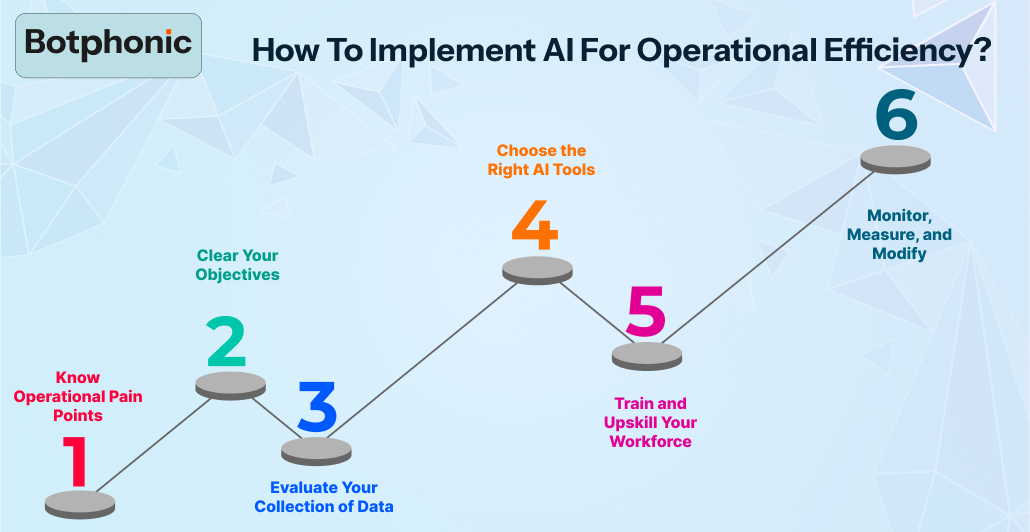
1. Know Operational Pain Points
To implement AI tools effectively in your business, analyze current operation and identify the obstacles which are leading to inefficiency.
You can check where the resources are being wasted or even which tasks are being repetitive, manual and even prone to error.
2. Clear Your Objectives
Set specific goals which are aligned to your business outcomes, such as reduce the processing time by 30% or increasing the accuracy in forecasting.
3. Evaluate Your Collection of Data
AI relies just on data, that too which is provided by you to assess the situation. Evaluate what data you have and is it structured or unstructured. You have to ensure it’s clean, accessible and centralized.
4. Choose the Right AI Tools:
To ensure smooth processing and learning of tools, select AI technologies which suit your needs and fulfill them. You can use predictive analysis, chatbots or even machine learning models for planning, customer service and forecasting.
5. Train and Upskill Your Workforce
By adding AI in your workspace, it changes workflows and roles, you should ensure that employees understand the new system. Add training programmes for employees to ensure their learning and let them know AI is there to enhance their jobs.
6. Monitor, Measure, and Modify
Once going live with the AI workflow, track performance continuously to know if AI is achieving your defined KPI? Is the work performance still the same or has it been smoother and faster than before?
5 Top Emerging Trends in AI for Operational Efficiency
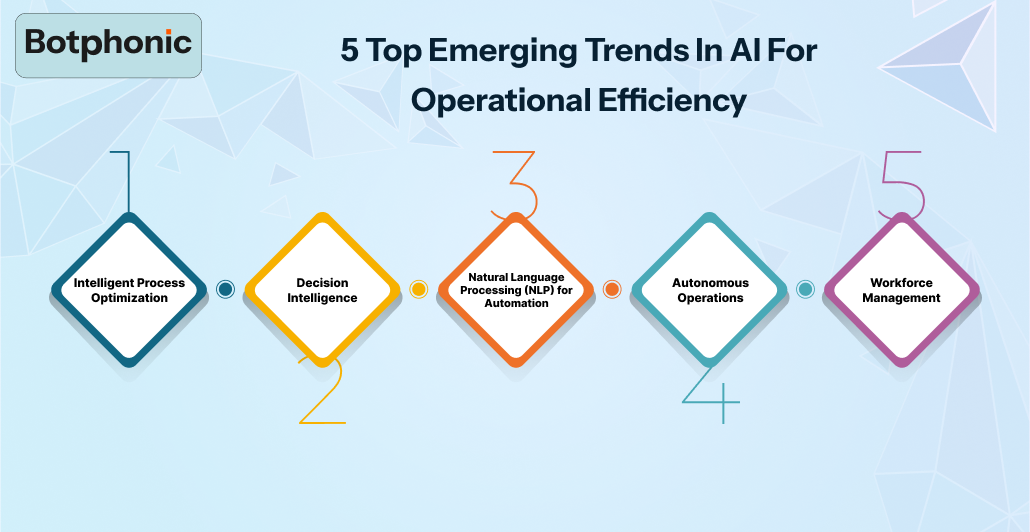
AI continues to reshape the future of business operations with its evolving technology, here are 5 top trends, which are redefining the ways in which you can increase your streamlining operations.
1. Intelligent Process Optimization
AI- driven process optimization helps in continuous improvement of workflows.. It uses learning algorithms to analyze, learn and improve in real-time. It identifies errors and inefficiencies occurring causing delays.
2. Decision Intelligence
Future AI systems are improving their strength and are providing context-aware recommendations by combining data models and human input to improve their strategic and operational decisions.
It helps generate predictive and prescriptive insights which supports the decisions with simulations and scenario analysis.
3. Natural Language Processing (NLP) for Automation
NLP helps machines understand and interact with human language, which makes it the most useful tool for automating documents and tasks which are communication centric. It concentrates and extracts essential data from raw and unorganized documents. It can interact with users via voice or chat using natural dialogue.
4. Autonomous Operations
Autonomous operations use AI tools and technologies to work independently and run parts of business operations. It doesn’t need constant human intervention as it takes real time actions based on defined rules or even trained models. It can handle exceptional situations efficiently.
5. Workforce Management
It helps companies to enable human resources management more efficiently, it can perform tasks such as scheduling, or even performance analysis. It forecasts an individual’s needs based on demand and seasonal trends.
Conclusion:
AI has taken over this world with its unique and helping tools. As we are moving deeper into business along with the digital first economy, it has become a necessity. Businesses that use AI for operational efficiency are having an upper hand than those using traditional methods. By automating tasks which are repetitive and enabling smarter decisions, it has become a friend no one knew we needed.
Artificial Intelligence offers a scalable, intelligent path to achieve this goal. By integrating the right AI strategies and technologies you can not only solve today’s errors but also prepare yourself for upcoming opportunities.

